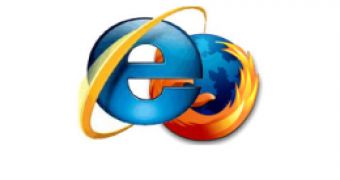Mozilla Firefox 2.0 is finding it difficult to breathe with the saturation that Microsoft is delivering by pushing Internet Explorer 7 via Automatic Updates. This is the conclusion presented by Web metrics company Janco Associates. The management consulting firm has revealed that Internet Explorer 7 has impacted the adoption rate of Firefox, and of the version 2.0 in particular, due to the fact that Microsoft's browser is delivered as an automatic update to the desktops of Windows users.
"We've started to see a stabilization of the marketplace," said Victor Janulaitis, Janco's CEO. "In three years, IE lost about 15% of the market share, but we're now seeing that leveling off." Market Share by Net Applications confirmed the fact that Microsoft has managed to contain over two years of continual browser market share loss.
Janco Associates has correlated the fact that Firefox's growth rate has diminished with the IE7 distribution via Automatic updates. Firefox managed to jump only from 12.5% to 13.4% since December 2006 until March 2007, while Internet Explore increased its market share from 67.5% to 70.5%, in the same period, according to Janco Associates.
Other analysts however do not share the perspective of Janco Associates. Geoff Johnston, an analyst at WebSideStory Inc. said: "I'm surprised at how well Firefox has done since IE7 came out. It looks like the forced migration of IE7 is helping Firefox." WebSideStory puts Firefox at 13.7% and IE at 82% of the market.
Both Internet Explorer 7 and Firefox 2.0 have experienced market share fluctuations in January 2007, reveals data published by Market Share by Net Applications. Still, in February 2007, the browsers returned to their past trends. Market Share gives IE 79.9% of the browser market and 14.18% to Firefox.

 14 DAY TRIAL //
14 DAY TRIAL //